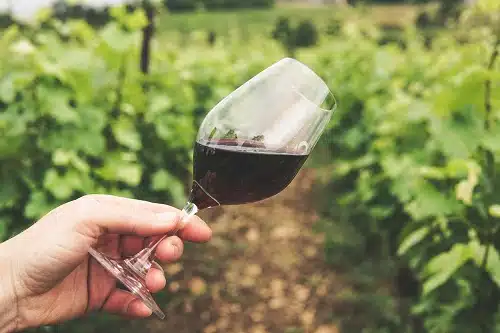Walking into a quaint wine shop, one is greeted by rows of bottles filled with various types of wine, each holding a story of taste and tradition. As a wine enthusiast, the allure of these bottles is undeniable. However, what happens to wine that is past its prime or simply left unfinished? This leads us to an intriguing question: Is wine good for plants? This concept might seem unusual at first, but exploring the uses for old wine in the context of gardening can unveil surprising benefits.
Understanding the Chemical Composition of Wine
Wine, a beverage celebrated for its rich flavors and cultural significance, is more than just a drink; it’s a complex mixture of chemicals with intriguing implications for gardening use. At its core, wine is made from fermented grapes, but the chemical journey from grape to glass is where the magic lies. The primary constituents of wine include ethanol (alcohol), water, sugars, organic acids, phenolic compounds, and various minerals.
Ethanol, the product of yeast fermentation of sugars in grapes, is the most recognized component in wine. In the context of gardening, ethanol’s role is nuanced. While high concentrations can be detrimental to plant health, causing dehydration and growth inhibition in very diluted forms, it can serve as a mild antiseptic, potentially warding off certain plant pathogens.
Sugars are another critical component, residual from the fermentation process. These sugars are a potential energy source for soil microorganisms, promoting a healthier soil biome. Their presence in wine can enhance microbial activity, aiding in the breakdown of organic matter and improving nutrient availability to plants.
Organic acids, such as tartaric and malic acid, contribute to the acidity of wine. When diluted, these acids can help modify soil pH levels, which benefits plants that prefer slightly acidic soil conditions.
Additionally, wine contains various minerals like potassium, magnesium, and calcium, essential for plant growth. In small quantities, these minerals can supplement the soil’s nutrient profile, supporting overall plant health.
In summary, the chemical composition of wine, characterized by a balance of ethanol, sugars, acids, and minerals, presents a unique opportunity for its use in gardening. Understanding these components is crucial in harnessing wine’s potential as a beneficial addition to garden care practices.
The Surprising Connection Between Plants and Wine
The relationship between plants and wine extends beyond the grapevines. It’s well-known that wine is rich in minerals and organic compounds. When we consider the uses for wine in the garden, it’s essential to understand how these elements can benefit plants. The key components in wine, such as sugars, acids, and alcohol (in small amounts), can influence plant growth and soil health in various ways.
The Science Behind Wine for Plants
When discussing the uses for old wine, it’s crucial to differentiate between beneficial and harmful quantities. Excessive alcohol can be detrimental to plants, causing dehydration and growth inhibition. However, wine can contribute positively to soil health in controlled, diluted quantities. The natural sugars in wine can promote microbial activity, enhancing soil fertility. Additionally, the acidity in wine can help balance the pH levels in certain types of soil.
Practical Applications: Using Wine for Plants
For gardening enthusiasts looking to experiment with wine for plants, here are some practical applications:
- Soil Enhancer: Diluted wine can be used as a soil enhancer. Mixing a small amount of wine with water and applying it to the soil can boost microbial growth, aiding in nutrient breakdown and absorption.
- Fertilizer Component: Old wine can be added to compost bins. The natural sugars and acids in wine accelerate the composting process, enriching the final compost used for gardening.
- Natural Pesticide: In certain situations, wine can act as a natural pesticide. The smell and taste of wine can deter some garden pests, though this method should be used cautiously to avoid attracting unwanted insects or animals.
Precautions and Best Practices
While exploring the uses for wine in gardening, it’s important to exercise caution. Here are some best practices to follow:
- Dilution is Key: Always dilute wine with water before using it for plants. This reduces the concentration of alcohol and acidity, making it safer for plant use.
- Quantity Matters: Use wine sparingly. A small amount goes a long way, and overuse can negatively affect plant health.
- Observe and Adjust: Monitor your plants’ response to the wine treatment. If any adverse effects are noticed, discontinue use immediately.
Guidelines for Using Wine in Different Types of Gardens
Utilizing wine in gardening is an innovative concept that requires understanding different garden types and their specific needs. Whether you have a lush flower garden, a productive vegetable plot, or a tranquil herb garden, the application of wine needs to be tailored to suit each environment.
Flower Gardens
In flower gardens, the primary goal is to enhance blooming and overall plant health. Wine can be used here as a soil amendment in very diluted form. Floral varieties such as roses and azaleas, which thrive in slightly acidic soil, may benefit from the subtle pH adjustment provided by diluted wine. However, caution is necessary to ensure the alcohol content does not harm the delicate root systems. A diluted solution of one part wine to ten parts water can be used sparingly, perhaps once a month, as an experimental treat for your blooms.
Vegetable Gardens
Vegetable gardens are more sensitive due to the direct consumption of their produce. Here, the use of wine should be more conservative. The diluted wine solution can help enhance microbial activity in the soil, which can aid in nutrient uptake for vegetables. However, it’s crucial to avoid any direct application on edible parts and to use wine only in off-seasons or well before harvesting to ensure no residual alcohol or acidity affects the produce.
Herb Gardens
Herbs often thrive in well-drained and slightly acidic soils, making diluted wine potentially beneficial. Small amounts of diluted wine can help herbs like thyme, sage, and rosemary. The key is minimal and infrequent application, ensuring that the natural growth of herbs isn’t adversely affected by the alcohol or acidity in the wine.
In all types of gardens, monitoring the plants’ response after applying wine is vital. Any signs of distress should be taken seriously, and the use of wine should be ceased immediately. Remember, the goal is to enhance and not harm your cherished garden.
Conclusion: A Toast to Innovative Gardening
Ultimately, while the concept of using wine for plants might raise eyebrows initially, it presents an innovative way to repurpose old wine. This practice not only benefits the environment by reducing waste but also offers a unique approach to enhancing garden health. As with any gardening experiment, it’s vital to proceed with caution and be mindful of the quantities and methods used. So, the next time you find yourself with leftover wine, consider giving your plants a taste of this elixir. Here’s to a new journey in the world of gardening, one where plants and wine come together in an unexpected yet potentially beneficial relationship.

